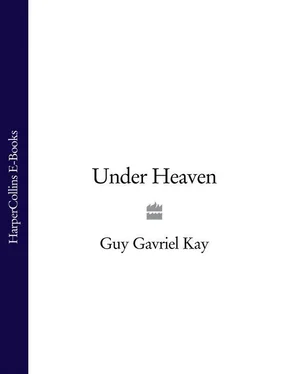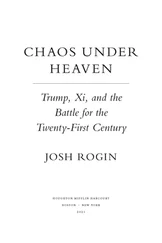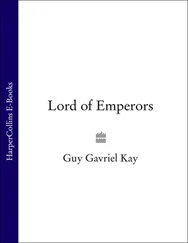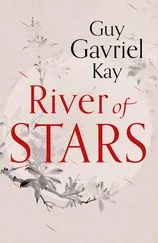As for ambitious younger men in the empire? Well, there had been steady fighting among the Bogü against their eastern rivals, the Shuoki, and in their own internal tribal wars, and these continued.
Military officers and youthful aristocrats (and brave men of no particular birth) had always been able to assuage a hunger for blood and sword-glory somewhere. For this time it was in the north, where the emptiness of the grasslands could dwarf a man, or change his soul.
For Shen Tai, second son of General Shen Gao, that last had been what had happened, years ago, during an autumn among the nomads.
IT WAS EXPLAINED to them that evil spirits, sent by tribal enemies, had afflicted the soul of Meshag, the son of Hurok.
Hurok had been the Ta-Ming’s chosen kaghan, the man they were in the steppe lands to support.
His eldest son, a man in the prime of health, had fallen suddenly, gravely ill—unresponsive, barely breathing—in the midst of a campaign. It was determined that shamans of the enemy had invoked dark spirits against him: so the nomads told the Kitan soldiers among them.
The imperial officers did not know how that understanding had been arrived at, or why the alleged magic was directed at the son and not the father (though some of them had views, by then, as to which was the better man). This business of Bogü magic—shamans, animal totems, spirit journeys from the body—was simply too alien, too barbaric, for words.
It was only reported to them as a courtesy, along with what apparently was going to be done in a desperate effort to make the sick man well. This last information had compelled some hard thinking among the army leaders sent north from Kitai.
Hurok was important and, therefore, so was his son. The father had sent private earnests of allegiance and offerings to the Long Wall in the spring—good horses and wolf pelts and two young women—his own daughters, apparently—to join the emperor’s ten thousand concubines in their palace wing.
Hurok, it emerged, was willing to contemplate a revolt against the ruling kaghan, his brother-in-law, Dulan.
Dulan had not sent as many horses or furs.
Instead, his envoys had brought weak, small-boned horses, some with colic, to the wide northern loop of the Golden River where the exchange was done each spring.
The kaghan’s emissaries had shrugged and grimaced, spat and gestured, when the Kitan pointed out these deficiencies. They claimed the grasses had been poor that year, too many gazelles and rabbits, sickness among the herds.
Their own mounts had looked sturdy and healthy.
It seemed to the senior mandarins charged with evaluating such information for the celestial emperor that Dulan Kaghan might have grown a little too secure, perhaps even resentful of his annual commitment to far-off Xinan.
It had been decided that a reminder of the power of Kitai was past due. Patience had been abused. The emperor had, once again, been too generous, too indulgent of lesser peoples and their insolence.
Hurok had been quietly invited to contemplate a more lofty future. He had done so, happily.
Fifteen thousand Kitan soldiers had gone north late that summer beyond the loop of the river, beyond the Wall.
Dulan Kaghan, with his own forces and followers, had been in strategic retreat ever since, maddeningly hard to pin down in the vast grasslands, waiting for allies from north and west, and for winter.
There were no cities to pillage and burn on the steppe, no enemy fortresses to besiege and starve into submission, no crops to ravage or seize, and they were acting for the man who needed to claim the trust of the nomads afterwards. It was a different sort of warfare.
The key was, clearly, to find and engage Dulan’s forces. Or just kill the man, one way or another. Hurok, however, in the growing opinion of the Kitan expeditionary army’s officers, was emerging as a feeble figure: a weak piece of pottery containing nothing but ambition.
He drank kumiss from first light, was drunk most of the day, sloppily hunting wolves, or lolling in his yurt. There was nothing wrong with a man drinking, but not on campaign. His eldest son, Meshag, was a better-fired vessel, so they reported back.
In the event, Meshag, in turn privately approached, did not appear to have any great aversion to the suggestion that he might aspire to more than merely being the strongest son of a propped-up kaghan.
They were not an especially subtle people, these nomads of the steppe, and the empire of the Kitan, amongst everything else, had had close to a thousand years and nine dynasties to perfect the arts of political manipulation.
There were books about this, any competent civil servant had them memorized. They were a part of the examinations.
“Consider and evaluate the competing doctrines emerging from Third Dynasty writings as to the proper conduct of succession issues among tribute-bearing states. It is expected that you will cite passages from the texts. Apply your preferred doctrine to resolving current issues pertaining to the southwest and the peoples along the margins of the Pearl Sea. Conclude with a six-line regulated-verse poem summarizing your proposals. Include a reference to the five sacred birds in this poem.”
Of course, the appraisal of this work also included judging the quality of the candidate’s calligraphy. Formal hand, not running hand.
With whom did these ignorant, fat-smeared barbarians, bare-chested as often as not, hair greasy and to their waists, smelling of sour, fermented milk, sheep dung, and their horses, think they were dealing?
But before this newer plan for the Bogü succession could be implemented, young Meshag had fallen ill, precisely at sundown, in his camp one windy autumn day.
He had been standing by an open fire, a cup of kumiss in one hand, laughing at a jest, a graceful man—then his cup had fallen into trampled grass, his knees had buckled, and he’d toppled to one side, barely missing the fire.
His eyes had closed and had not opened again.
His women and followers, extravagantly distressed, made it clear that this had to have been done by sinister powers—there were unmistakable signs. Their own shaman, small and quavering, said as much but admitted, in the morning, after a night spent chanting and drumming at Meshag’s side, that he was unequal to shaping a response capable of driving malign spirits from the unconscious man.
Only someone he named as the white shaman of the lake could overmaster the darkness sent to claim Meshag’s soul and bear it away.
This lake was, it appeared, many weeks’ journey north. They would set out the next morning, the Bogü said, bearing Meshag in a covered litter. They did not know if they could keep his soul near his body for so long but there was no alternative course. The little shaman would travel with them, do all he could.
Whatever the Kitan expeditionary force thought about this, there wasn’t much they could do. Two army physicians, summoned to take the man’s pulses and measure auras, were at a loss. He breathed, his heart beat, he never opened his eyes. When the eyelids were lifted, the eyes were black, disturbingly so.
Meshag was, for good or ill, a component of imperial strategy now. If he died, adjustments would have to be made. Again. It was decided that a number of their own cavalry would go north with his party, to maintain a Kitan presence and report back immediately if the man died.
His death was what they expected. Advance word would go to Xinan immediately. The assigned cavalry officer riding north with the Bogü was to exercise his best judgment in all matters that arose. He and his men would be desperately far away, cut off from all others.
Shen Tai, son of Shen Gao, was selected to lead this contingent.
Читать дальше












